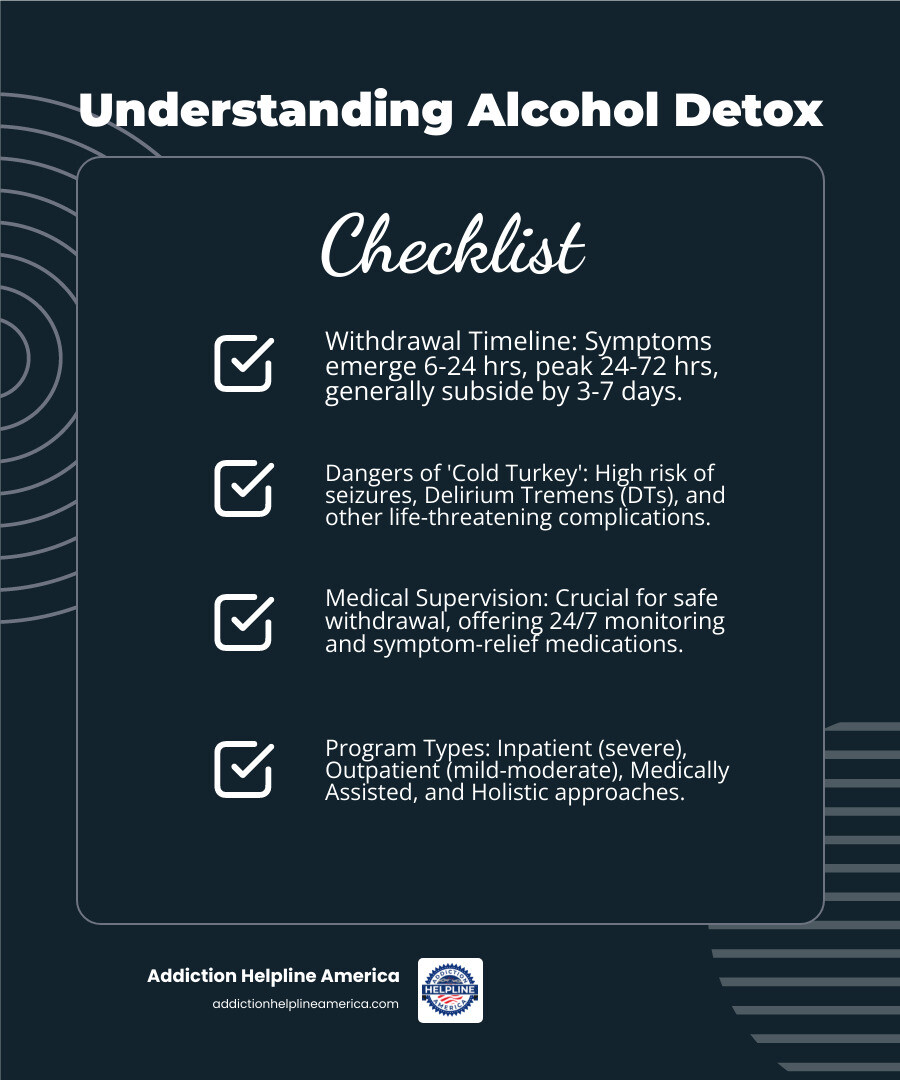
Understanding What an Alcohol Detox Program Can Do for You
An alcohol detox program is a medically supervised process to help people safely withdraw from alcohol while managing dangerous symptoms. These programs typically last 3-7 days, providing 24/7 medical monitoring, medication, and preparation for ongoing addiction treatment.
Key Types of Alcohol Detox Programs:
- Inpatient Detox – Stay at a facility with round-the-clock medical care (best for severe addiction)
- Outpatient Detox – Live at home while attending daily treatment sessions (suitable for mild-moderate cases)
- Medically Assisted Detox – Uses medications like benzodiazepines to prevent seizures and reduce symptoms
- Holistic Detox – Combines medical care with nutritional support, therapy, and wellness activities
Withdrawal symptoms like anxiety, tremors, and nausea can start 6-24 hours after the last drink. Severe cases can involve seizures or delirium tremens (DTs), a life-threatening condition requiring immediate medical help.
Stopping “cold turkey” is dangerous. Medical detox is the safest path, and studies show it increases long-term recovery success by 50-75%.
At Addiction Helpline America, our addiction specialists have helped thousands find the right alcohol detox program. We understand this choice is overwhelming, so we offer free, confidential guidance 24/7 to connect you with treatment options matching your needs.
Understanding Alcohol Detox and Why It’s Crucial
Quitting alcohol requires understanding the life-saving difference between medical detox and going it alone. An alcohol detox program provides essential medical supervision during withdrawal, a process that can be dangerous without support.
If your body is physically dependent on alcohol, it has adapted to its presence. Suddenly stopping creates what is known as Alcohol Use Disorder (AUD) withdrawal. Signs you need professional help include feeling sick, anxious, or shaky without a drink, or having failed previous attempts to quit due to severe symptoms.
The biggest mistake is quitting “cold turkey.” The body can react with dangerous seizures or Delirium Tremens (DTs), a severe condition with a high fatality rate without medical care. Scientific research on Alcohol Withdrawal Syndrome confirms that medical supervision dramatically reduces these risks.
When Medical Detox is Necessary
Medical detox is essential in certain situations:
- History of heavy drinking: A history of heavy, daily drinking increases physical dependence and withdrawal intensity.
- Previous withdrawal complications: If you’ve had seizures or hallucinations during past withdrawals, your risk is higher due to the “kindling effect,” where each withdrawal can be worse.
- Co-occurring medical conditions: Medical issues like heart or liver disease make withdrawal more dangerous.
- Co-occurring mental health disorders: Mental health disorders like anxiety or depression can worsen during withdrawal, making professional, integrated care essential.
- Lack of a stable support system: Without a stable support system at home, a medical detox facility provides a necessary safety net.
Signs and Symptoms of Alcohol Withdrawal
Withdrawal can start within 6 hours of your last drink. Early signs include anxiety, tremors (“the shakes”), headaches, and nausea and vomiting. Insomnia is also common, as the brain struggles to rest without alcohol. Many experience sweating and dangerous spikes in heart rate and blood pressure.
More severe symptoms include terrifying hallucinations. In the most serious cases, seizures or Delirium Tremens can occur, requiring emergency medical attention. Fortunately, medical detox can safely manage all these symptoms.
The Alcohol Detox Process: What to Expect
Starting an alcohol detox program can feel overwhelming, but knowing what to expect helps. Upon arrival, you’ll undergo a thorough intake and assessment. This includes questions about your drinking history, a medical evaluation with a physical exam and lab tests, and a psychological screening to identify any co-occurring mental health needs. This information is used to create a personalized plan.
Throughout your stay, you’ll receive 24/7 monitoring from medical staff for your safety and reassurance. Nutritional support, including healthy meals and possibly IV fluids or vitamins, helps your body start healing.
A Typical Alcohol Detox Timeline
While every detox is unique, a general timeline exists:
- Initial hours (6-12): Mild symptoms like anxiety and headaches appear.
- First 24-72 hours: Symptoms peak. This is when the risk of seizures is highest, making medical supervision critical. Delirium Tremens can also develop.
- Days 3-7: Symptoms begin to subside, and the focus shifts to stabilization.
The duration depends on factors like drinking history and overall health. The acute phase averages 2-8 days, though some psychological symptoms may linger.
What to Expect During a Medical Alcohol Detox Program
During your alcohol detox program, you receive personalized care custom to your needs. Medication management is key; benzodiazepines are often used to prevent seizures and ease anxiety, with dosages adjusted as you stabilize. Other medications may manage nausea or high blood pressure.
Symptom monitoring is constant but caring, with staff checking vital signs to prevent complications. Many programs offer therapeutic support, like counseling, to begin addressing the emotional side of recovery. Transition planning starts early, as the team works with you to determine the next step, such as inpatient or outpatient treatment, ensuring you’re prepared for long-term success. You can find more detailed information about the medical aspects of detoxification through official government resources on the detoxification process.
Types of Alcohol Detox Programs and Medical Support
An alcohol detox program isn’t one-size-fits-all. The two main types are inpatient (residential) detox and outpatient detox. Inpatient detox provides 24/7 medical supervision in a trigger-free facility, making it the safest option for severe dependence or unstable home environments. Outpatient detox allows you to live at home and attend daily sessions, suitable for mild-to-moderate symptoms and a strong support system. Other options like Partial Hospitalization Programs (PHP) and Intensive Outpatient Programs (IOP) offer a middle ground with structured treatment during the day.
| Feature | Inpatient (Residential) Detox | Outpatient Detox |
|---|---|---|
| Setting | Live at a dedicated treatment facility | Live at home, attend daily sessions at a clinic |
| Medical Care | 24/7 medical supervision and support | Regular medical check-ins, but not continuous monitoring |
| Environment | Highly structured, immersive, free from external triggers | Allows continuation of daily responsibilities (work, family), familiar environment |
| Suitability | Severe alcohol dependence, high risk of complications, unstable home environment | Mild to moderate withdrawal, stable home environment, strong support system |
| Cost | Generally higher due to 24/7 care and accommodation | Generally lower, more flexible |
| Services | Medical detox, therapy, counseling, nutritional support | Medical detox, therapy, counseling, often less intensive |
Medications Used in Alcohol Detox
A major benefit of a medical alcohol detox program is access to medications that make withdrawal safer.
- Benzodiazepines like Valium and Ativan are crucial for calming the nervous system to prevent seizures and reduce anxiety. Information on Benzodiazepines offers more detail.
- Anticonvulsants provide an additional layer of protection against seizures.
- Beta-blockers help manage physical symptoms like rapid heart rate and high blood pressure.
- Naltrexone and Acamprosate are important for post-detox recovery to reduce cravings, though not typically used during acute detox.
Choosing the Right Type of Alcohol Detox Program
Picking the right alcohol detox program depends on several key factors:
- Severity of addiction: Severe dependence points to inpatient care; mild cases may suit outpatient.
- Physical health status: Co-existing medical conditions like heart or liver disease make inpatient monitoring safer.
- Mental health conditions: Integrated care for co-occurring disorders like depression or anxiety is crucial, often best provided in an inpatient setting.
- Home environment and support: A supportive, stable home is necessary for outpatient success. Otherwise, inpatient provides a safe space.
- Cost and insurance coverage: Most insurance plans cover medically necessary detox. At Addiction Helpline America, we can help you verify benefits and find affordable options. Professional detox is an investment in your future.
Finding a Safe Program and Navigating Costs
Finding the right alcohol detox program is a crucial first step, and you don’t have to do it alone. At Addiction Helpline America, we can guide you.
A quality program uses evidence-based treatment—methods proven by scientific research. Look for licensed and accredited facilities, which ensures they meet strict safety and quality standards. The team should include qualified medical staff experienced in addiction medicine. A good program creates individualized treatment plans custom to your needs and includes aftercare planning to prepare you for long-term recovery.
How to Choose a Reputable Facility
To choose a reputable facility:
- Ask about staff credentials to ensure they are licensed and experienced.
- Inquire about their treatment philosophy to see if it aligns with your needs.
- Check for state licensure and accreditation from bodies like the Joint Commission.
- Read reviews and testimonials for insight into patient experiences.
- Tour the facility if possible to see if it feels like a safe and welcoming environment.
The Role of Insurance in Paying for Detox
Cost is a common concern, but the Affordable Care Act deems addiction treatment an essential health benefit, meaning most insurance plans offer coverage for an alcohol detox program. Insurers typically cover services that are medically necessary, which includes alcohol detox due to its life-threatening risks.
Understand the difference between in-network (lower cost) and out-of-network (higher cost) providers. Verifying your benefits can be confusing; our team at Addiction Helpline America can help you steer this for free. Be prepared for copays and deductibles. While cost is a barrier for many—with only 4.6% of those needing treatment receiving it according to Statistics on alcohol treatment in the U.S.—we are here to help you overcome these challenges.
Life After Detox: The Path to Long-Term Recovery
Completing an alcohol detox program is a courageous first step, but it’s the beginning of recovery, not the end. Addiction is a chronic condition requiring ongoing management. Detox addresses the physical crisis, but the psychological and behavioral aspects of drinking also need attention. Lasting recovery is possible by building coping skills and healthy habits over time.
Next Steps in a Broader Treatment Plan
After your alcohol detox program, transitioning to continued treatment is key for lasting sobriety. Options include:
- Residential or inpatient rehab: An immersive, trigger-free environment for those with severe dependence.
- Partial Hospitalization Programs (PHP) and Intensive Outpatient Programs (IOP): Structured treatment that allows you to live at home.
- Individual therapy: Approaches like Cognitive Behavioral Therapy (CBT) help change thought patterns and manage stress.
- Family counseling: This can heal relationships and build a supportive home environment.
Follow-Up Care for Long-Term Sobriety
Long-term sobriety is about building a meaningful life. This requires ongoing support.
- Support groups: Groups like AA and NA offer invaluable peer understanding.
- Sober living homes: These offer a structured, alcohol-free environment to practice recovery skills.
- Relapse prevention planning: This involves identifying triggers and developing strategies to handle them.
- Building a sober support network: Prioritize relationships that support your recovery.
At Addiction Helpline America, we guide you through these next steps, connecting you with the right resources for every stage of your journey.
Frequently Asked Questions about Alcohol Detox
We understand that considering an alcohol detox program brings up many questions. Here are straightforward answers to some common concerns.
How long does alcohol detox typically last?
The acute phase of an alcohol detox program usually lasts from two to eight days. The exact duration depends on factors like your drinking history, the amount you drank, and your overall health. Some psychological symptoms, known as post-acute withdrawal syndrome (PAWS), like anxiety or sleep issues, can persist for weeks or months but will gradually improve with support.
Is medical detox for alcohol safe?
Yes, a medically supervised alcohol detox program is the safest way to withdraw from alcohol. Attempting to detox alone can be life-threatening. In a medical setting, staff monitor you 24/7, administer medications to prevent complications like seizures, and can intervene immediately if serious issues like Delirium Tremens arise. This makes the process much safer and more manageable.
What happens after I complete an alcohol detox program?
Completing detox is a huge achievement, but it’s the first step. Detox addresses the physical dependence, not the underlying psychological aspects of addiction. The recommended next step is a comprehensive treatment program, such as inpatient rehab or an intensive outpatient program (IOP). These programs teach you coping skills for long-term sobriety. At Addiction Helpline America, we can guide you in transitioning from detox to the right ongoing treatment.
Conclusion
Taking the first step toward recovery is courageous. An alcohol detox program is a critical and safe process with professional support, and you should never attempt to detox alone.
Recovery is a journey, not a destination. Detox clears the fog, but the real work of building a sober life happens in the ongoing treatment that follows.
At Addiction Helpline America, our mission is to bridge the gap between where you are and where you want to be. Our team of specialists provides free, confidential guidance 24/7 to help you find the right alcohol detox program and subsequent care for your specific needs. You’ve already taken the hardest step. Let us help you with the next one.
Our helpline is 100%
free & confidential
If you or someone you care about is struggling with drug or alcohol addiction, we can help you explore your recovery options. Don’t face this challenge alone—seek support from us.
Programs
Resources
Will my insurance
cover addiction
treatment?
We're ready to help
Find the best
drug or alcohol treatment
center
Are you or a loved one struggling with addiction? Call today to speak to a treatment expert.






